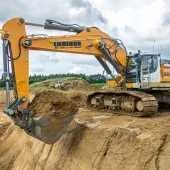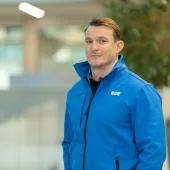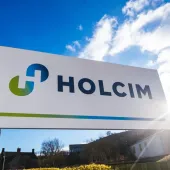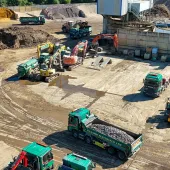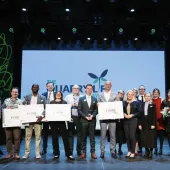CDE Global and Feess Erdbau Project to Improve the Quality of Recycled Aggregates

First published in the October 2014 issue of Quarry Management as CANDY Know-how
A new European-funded project by materials washing specialists CDE Global and German recycling operators Feess Erdbau aims to improve the quality of recycled sand and aggregates produced from construction, demolition and excavation (CD&E) waste. QM spoke to Peter Craven, head of marketing at CDE, and Walter Feess, managing director of Feess, about the technological innovations and environmental benefits of the recycling plant operating in Stuttgart, Germany
With sustainability now the norm in the construction materials sector, it comes as no surprise to learn that recycled and secondary aggregates are making an increasingly important contribution to the UK’s ‘green’ building practices. By reducing demand on primary aggregates, the production of construction materials from inert waste is helping the industry to not only become more sustainable, but also to fulfil its regulatory responsibilities and environmental aspirations.
In the UK, around 23% of total aggregates production is currently from recycled sources, representing approximately 40 million tonnes. According to the Mineral Products Association (MPA), this annual output and market share is three times higher than the European average, putting Britain at the forefront of recycling practice across the European Union.
The revised Waste Framework Directive – which requires EU member states to recover a minimum of 70% of construction and demolition waste by 2020 – will encourage further use of recycled/secondary aggregates and minimize waste from an environmental and cost-saving point of view.
The increased volumes will also demand that advanced processing systems for the treatment of CD&E waste are more widely adopted in the EU, which is something that Peter Craven, head of marketing at CDE Global, hopes to achieve with the CANDY project.
‘I think we need to look beyond the quantity and focus on the quality of the recycled materials that we produce,’ he said. ‘Many of the countries in the EU are well on course to comfortably meet the targets of the Waste Directive so we need to move on to the next level in terms of how we can extract maximum value from this waste stream and further enhance the quality of recycled products.’
Supported by the EU’s Eco-innovation fund, the project is a partnership between Northern Ireland-based CDE and German recycling contractors Feess Erdbau operating under the acronym CANDY – ‘CompAct, highly mobile, Next generation, CD&E waste recoverY system’.
To raise international awareness of the project, CDE hosted a European open week event (16-18 September 2014) at Feess’ Kirchheim recycling facility in Stuttgart, where potential customers, EU representatives, members of waste recycling associations and other interested stakeholders visited the demonstration site to watch the new technology in action.
‘The open week proved to be a resounding success and feedback from the delegates has been excellent,’ said Mr Craven. ‘It is only through the deployment of advanced waste recycling systems, such as the wet processing plant we have installed on the CANDY project, that we are able to increase awareness about the high-value recycled products that can be produced.’
Setting an example
The UK is currently leading the way in waste recycling technology. Washing systems, in particular, have evolved rapidly in recent years and are expected to have a huge impact on reducing CD&E waste going to landfill in line with the EU Waste Framework Directive.
New advances in washing and processing systems will no doubt be fully embraced as newer environmental legislation and sustainable working practices are introduced, but Mr Craven warns that there is still a lot of encouraging and convincing to do across Europe.
‘There is still a challenge, particularly in Central and Eastern Europe, to inspire and encourage more businesses to reclaim and reuse materials,’ he said. ‘As waste materials recycling is already the norm in the UK and Ireland, the CANDY project will, importantly, allow us to promote
and demonstrate the environmental technologies that we manufacture to the German marketplace and other EU countries. There is a clear lack of knowledge in the wider European sector and companies need to be aware of the benefits that recycled materials can bring to them in the long term.’
The Eco-innovation fund supports environmental technologies that have been introduced extensively in one EU member state but have not as yet been widely adopted throughout the EU. According to Mr Craven, CDE’s successful application to the Eco-innovation project was down to the company’s ambitious technical, commercial and environmental objectives.
‘I think we fitted the bill perfectly,’ he explained. ‘Our application was built on the basis that we wanted to take the knowledge and expertise that we have gained in the UK recycled aggregates market over the last decade – and develop the technology further to ensure we, as an industry, are able to enhance the CD&E waste recycling process across the EU.’
Some of the technical achievements on the CANDY project include greater mobility and reduced plant footprint, as well as higher quality washed recycled sand and aggregate products.
CDE and Feess have also gained a number of environmental benefits with the demonstration plant, which produces recycled materials at a rate of up to 80 tonnes/h. These include: a significant reduction in water consumption; optimum water recycling for recirculation to the washing plant (early results show a minimum of 91% is achievable); and maximum material recovery from CD&E waste, which leads to reduced transportation and disposal requirements as a result of minimal waste.
Mr Craven pointed out the most challenging aspect of the CANDY project has been to offer new sludge-management technology with a specific focus on maximizing the recovery of process water for recirculation to the washing plant.
‘We’ve introduced a number of new product developments on the water treatment, filtration and sludge- management side,’ he explained. ‘One of the key product innovations that we’ve installed on site is the new AquaCell thickener and sludge concentrator, which is the latest development of our AquaCycle thickener technology. The system is a rectangular yet more compact unit specially designed for easier transportation, quicker installation and optimized sludge concentration.’
German connection
Formed in 1951, Feess Erdbau are a family-owned business specializing in transportation, civil engineering, demolition and recycling. Operating three waste-processing facilities in the Stuttgart area, Feess have built a reputation as a leading supplier of recycled materials in the local markets.
According to Walter Feess, managing director, one of the key contributing factors to the success of the company in this market sector is its ability to provide customers with a ‘one-stop shop’ of products/services from a single location, together with the subsequent logistical savings.
‘We originally started out as a haulage firm but we decided to change our business model and move into other areas of civil engineering, demolition and recycling,’ said Mr Feess. ‘The decision to diversify has paid dividends ever since, as it has given us the flexibility to cater for, and adapt to, the changing needs of the market.
‘Expanding our portfolio of recycled sand and aggregates and offering customers first-class waste-management services have been, and will continue to be, a very important focus for us. The CANDY project demonstrates our commitment to improving the quality of recycled products from CD&E materials.’
The connection between CDE and Feess was first made at the Bauma 2013 exhibition, and following a meeting it became very clear that it was a good opportunity to develop a new partnership given the philosophy of both companies.
‘Feess certainly met our ideal partner profile on the CANDY project,’ said Mr Craven. ‘Walter is very passionate about the use of environmental technologies and the commercial benefits they can bring. He recognized the potential for recycling CD&E waste more than 20 years ago, and today sustainability plays an integral part of his business.
‘Walter decided to diversify the company’s operations. Having a stronger focus on increased recycling, coupled with a sense of responsibility in relation to the protection of natural resources for future generations, has led Feess to invest significantly in waste recycling/minimization in recent years. It just made perfect sense that we partnered with Walter and his team on the project.’
Environmental efficiency
The next step for CDE and Feess was to identify a suitable operational site for the CANDY programme, and the German operator’s Kirchheim recycling facility – which opened in 2010 – was chosen as the project’s demonstration venue.
‘The CANDY project is about protecting long-term aggregates supply from a sustainable source, so it was important we used a site that set a benchmark for everyday sustainable working practices,’ said Mr Feess.
‘The Kirchheim site clearly shows that we are sustainability driven and demonstrates a number of environmental initiatives focused on water management, minimizing waste, energy savings, working with the community and carbon management.’
In the area of renewable technologies, the company produces its own power using photovoltaic cells to cover the waste reception and storage areas across the site. Feess have also embraced the principle of conserving precious water resources – the company’s unique, fully integrated rainwater harvesting system has been designed to provide sufficient water for on-site cleaning, dust suppression, sand and aggregate washing etc.
Interestingly, the 30,000m2 Kirchhiem site has been built on a slope designed to allow water to run down to the collection point ensuring the recycling facility remains dry at all times.
Mr Feess continued: ‘On the CANDY project it is vitally important both for the environment and for us that we share and spread our eco-friendly practices as far and wide as possible across the EU recycling sector. Developing these sustainability-focused initiatives has not only enhanced the quality of the surrounding environment, but has also contributed significantly to our business success. The CDE processing plant, for example, has opened up more commercial opportunities for us, the most significant of which is the production of the highest-quality recycled products at the lowest cost of production.’
A variety of materials are currently being processed through the washing plant, including C&D waste from the demolition contracts carried out by Feess, and excavation waste from the numerous groundworks projects that the company is involved in.
Before the CDE processing plant was installed at Kirchhiem, around 10% of the overall demolition waste collected on site could not be recycled as it was a mixture of demolition and excavation waste (from building foundations). With the CANDY project up and running, the waste material is being processed successfully resulting in reduced waste from demolition contracts and increased volumes of recycled sand and aggregates for reuse.
Strengthening R&D
Research and development has always been, and continues to be, high on CDE’s agenda and the company intends to break into the European CD&E waste recycling market by emphasizing the environmental and commercial benefits of its demonstration plant in Stuttgart.
‘The CANDY project is proof of our substantial investment in R&D; supporting customers, making improvements in capacity and energy efficiency, and implementing new innovations and technologies,’ explained Mr Craven.
‘In today’s market, construction materials suppliers want a lot more than the plant and equipment installed on site; they want equipment manufacturers to help them deliver the best processing solutions and learn about the latest developments in sustainable aggregates production and high-percentage recycling technology. Working in partnership with Feess on the programme highlights this client-focused approach and the commitment that exists to improving the technology and infrastructure available for CD&E waste recycling throughout the EU.’
Following final commissioning of the CANDY project in May, CDE have been gathering performance data from the plant which, Mr Craven hopes, will lead to more varied waste materials being processed. Through a partnership with Stuttgart University, extensive material testing is being conducted to establish the suitability of the processing plant’s recycled sand and aggregates for use in high value construction applications such as concrete and asphalt.
As the CANDY project has demonstrated, CDE are fully committed to encouraging innovation and developing new processes and solutions for any given waste recycling application. It is this ability and agility in plant design, say CDE, that ensures the company is in a prime position to design and deliver the most efficient and most productive processing systems available in the market.
For more information on the CANDY Project visit: www.cdecandyproject.com
- Subscribe to Quarry Management, the monthly journal for the mineral products industry, to read articles before they appear on Agg-Net



